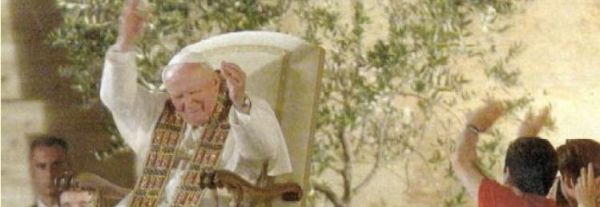To the disciples Jesus addresses the invitation to rejoice, to overcome the temptation of sadness for the departure of the Master, because this departure is a condition laid down in the divine plan for the coming of the Holy Spirit: "It is good for you that I go away, because if I do not go away the Paraclete will not come to you; but when I have gone away, I will send him to you" (Jn 16:7). It will be the gift of the Spirit that will bring the disciples great joy, indeed the fullness of joy, according to the intention expressed by Jesus. After inviting the disciples to remain in his love, the Saviour said: "This I have spoken to you that my joy may be in you and that your joy may be full" (Jn 15:11; cf. Jn 17:13). It is the Holy Spirit who puts into the hearts of the disciples the same joy as Jesus, the joy of faithfulness to the love that comes from the Father.
St Luke records that the disciples, who at the time of the Ascension had received the promise of the gift of the Holy Spirit, "returned to Jerusalem with great joy and were always in the temple praising God" (Lk 24:52-53). In the Acts of the Apostles it appears that, after Pentecost, a climate of profound joy was created in the Apostles, which was communicated to the community in the form of exultation and enthusiasm in embracing the faith, receiving baptism, and living together, as evidenced by "taking meals with gladness and simplicity of heart, praising God and enjoying the sympathy of all the people" (Acts 2:46-47). The book of Acts notes: "The disciples were filled with joy and with the Holy Spirit" (Acts 13, 52).
6. Soon would come the tribulations and persecutions foretold by Jesus in announcing the coming of the Paraclete-Consoler (cf. Jn 16:1ff). But according to Acts, joy endures even in trial: we read that the Apostles, when they were brought before the Sanhedrin, flogged, admonished and sent home, returned "rejoicing that they had been outraged for the sake of the name of Jesus. And every day, in the temple and at home, they did not cease to teach and to bring the good news that Jesus is the Christ" (Acts 5:41-42).
This, after all, is the condition and lot of Christians, as St Paul reminds the Thessalonians: "You have become imitators of us and of the Lord, having received the word with the joy of the Holy Spirit even in the midst of great tribulation" (1 Thess 1:6). Christians, according to Paul, repeat in themselves the paschal mystery of Christ, which has the Cross as its pivot. But its crowning glory is the "joy of the Holy Spirit" for those who persevere in trials. This is the joy of the beatitudes, and more particularly the beatitude of the afflicted, and of the persecuted (cf. Mt 5:4, 10-12). Did not the Apostle Paul say: 'I rejoice in the sufferings I endure for you . . ." (Col 1:24)? And Peter, for his part, exhorted: "Inasmuch as you share in the sufferings of Christ, rejoice, that in the revelation of his glory you may also rejoice and exult" (1 Pet 4:13).
Let us pray to the Holy Spirit to kindle in us more and more the desire for heavenly goods and make us one day enjoy their fullness: "Give virtue and reward, give holy death, give eternal joy.
Amen.
[Pope John Paul II, General Audience, 19 June 1991]












